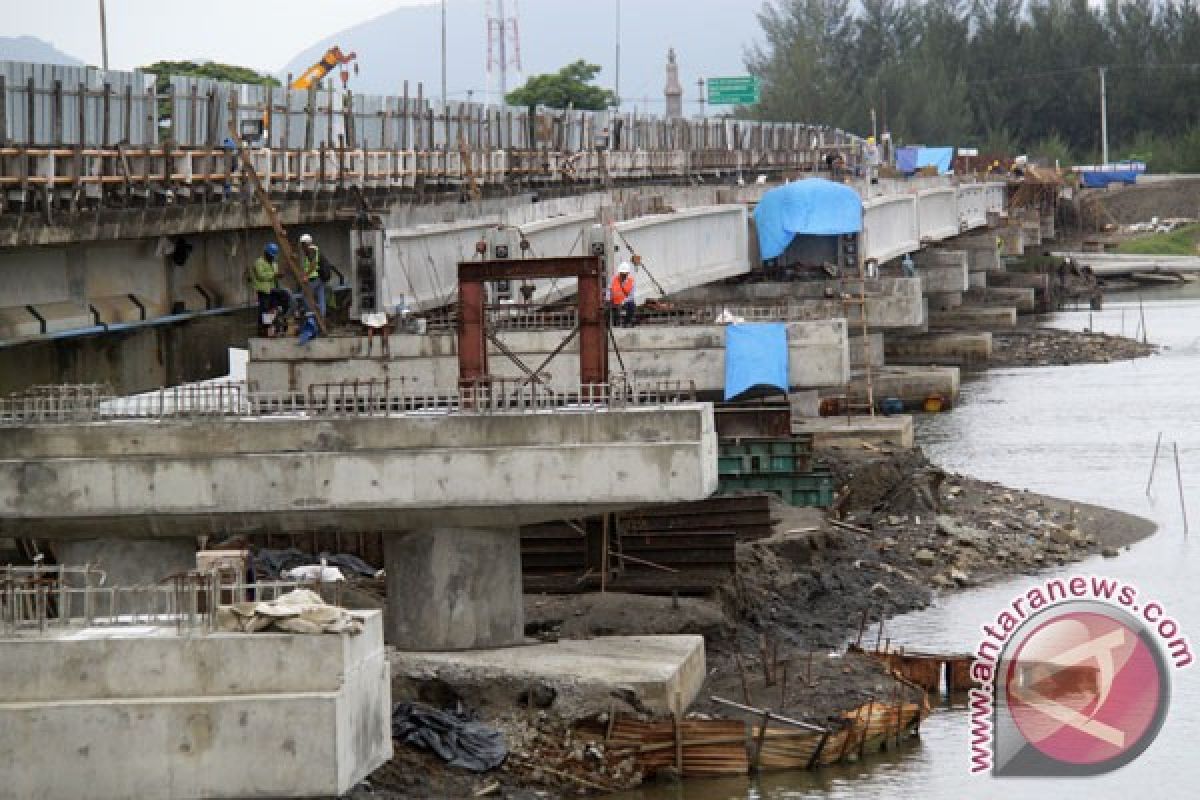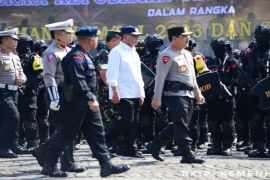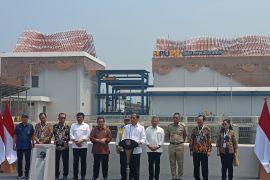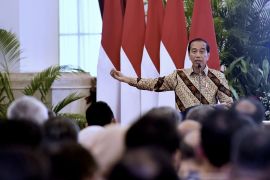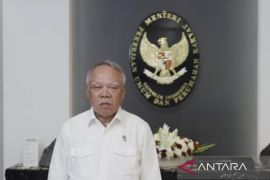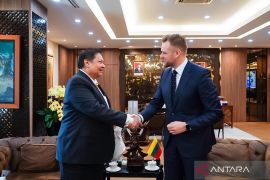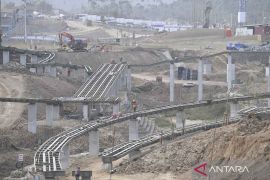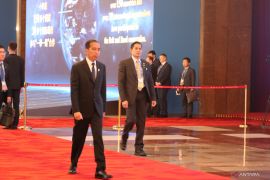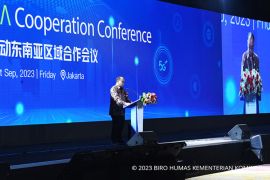There is no other logical way, but to accelerate infrastructure development."Jakarta (ANTARA News) - The key to success in transforming backwardness into modernity is infrastructure. Indeed civilization is often gauged by the condition and availability of infrastructure.
The past glory of the ancient Hinduism and Buddhist kingdoms in Indonesia is marked by traditional irrigation system and many temples and other artifacts in Java. Even the heyday of the Dutch colonization had a legacy in Indonesia in the form of infrastructure. Most of the countrys railways and highways date back to the Dutch colonial time.
Poor infrastructure has often been the complaint of investors and prospective investors in the country. Indonesia is one of the favorite investment destinations in the world but many investors think twice before embarking on big ventures because of inadequate infrastructure.
The country with a population of around 260 million or the fourth largest in the world would need around Rp150 trillion a year to modernize its basic infrastructure including roads and bridges, irrigation systems and water reservoirs or dams.
A much larger budget would be needed for power plants, ports, airports and other modern infrastructure.
Official data at the National Development Planning Board said in the 2014-2019 period the country would need a budget of Rp5,000 trillion for infrastructure development, while the state budget could put up only Rp600 trillion. That means the government has to find way to plug up the big deficit.
Observers and economists in Indonesia have often attributed the countrys weak competitiveness to inadequate infrastructure, poor bureaucracy and corruption.
According to data from World Economic Forum (WEF) 2016, Indonesia was the 37th among 144 countries in competitiveness.
Among the 10 countries of the Association of Southeast Nations (ASEAN) Indonesia is the largest economy but only the fourth in competitiveness after Singapore, Malaysia and Thailand.
In competitiveness and quality of infrastructure the country was ranked the 82 among 142 countries, Public Works and Housing Minister Basuki Hadimuljono has been quoted as saying.
Bridging the gap
President Jokowi himself acknowledged that the condition of the countrys infrastructure is far from adequate especially in the eastern part of the country. Poor infrastructure has caused problem in logistics. As a result, the price of manufactured goods brought in from other regions like fuels and building materials could be more than ten times more expensive in Papua and West Papua because of the high logistic cost.
In Papua and West Papua access to interior areas is only through the air because of the difficult terrain especially in the mountainous districts.
Ricky Ham Pagawak, the regent of Mamberamo Tengah (Mamteng), Papua, once cited in the municipal city of Kobakma the price of cement was as high as was Rp2,026,000 per sack as against only around Rp70,000 in Java and Premium gasoline and automotive diesel were sold at Rp50,000 and Rp60,000 per liters respectively as against less than Rp10,000 in Java.
As there is no regular flight, travelers or traders have to use charter flight between districts. A charter flight from Sentani to Kobakma is around Rp40 million and from Wamena to Kobakma is Rp28 million.
Hoping to reduce the logistic cost, the government is building road between Kobakma and Wamena. Construction is underway from both ends Kobakma and Wamena. Both ends are expected to be connected by the end of this year.
"The cost of building a road here is around Rp3.5 billion per kilometer . The construction of the 11 kilometer highway , therefore, would cost around Rp40 billion," the regent said, adding in Java the cost of building a road of the same class is only around Rp8 billion.
Acceleration
Papua is known to be rich in natural resources and the riches are largely untapped, but few investors would risk to venture in the regions on poor condition of infrastructure and high logistic cost.
Aware of the condition the Jokowi government has put high priority on infrastructure in its development program until 2019.
"There is no other logical way, but to accelerate infrastructure development," Jokowi once said.
Acceleration has become a catchword in the country today.
Under the Jokowi government, development of infrastructure is the key to success in the countrys economic development to catch up with neighboring countries.
Minister of Public Works and Housing Basuki Hadimuljono did not promise much when he was installed and named to be in charge of most infrastructure development projects in the country. He said nothing of breakthrough but he pledged he would work hard to follow his boss, whose slogan is work, work and work.
"We promise no breakthrough, but we will work hard, accelerate all process from planning to implementation," he said.
He said tenders would be held in the last quarter of year for projects to be built in the next year that implementation could start earlier.
"For projects already under construction, work are made in three shifts from normally two shifts. Currently in all infrastructure projects under the public works ministry, work is already in three shifts," the minister said.
He said the government has prepared bridging fund that could be used for land clearing, which is the responsibility of the government.
The minister promised no breakthrough , but it is perhaps more than a breakthrough when the government gives priority in infrastructure development in frontier areas and outermost regions, so far have been almost forgotten. In the past, development has been concentrated in western part of the country especially in Java, leaving other much richer regions in natural resources such as Kalimantan and Papua lagging behind.
In 2016, there are a number of strategic projects showing significant progress in major infrastructure development outside Java such as Light Rail Transit (LRT) in Palembang, South Sumatra, Palapa Ring Broadband that already reached eastern part of the country, and Revitalization of airports of Juwata of Tarakan, Matahora of Wakatobi and Labuhan Bajo of West Nusatenggara.
In Java, there are Serang-Panimbang toll road, Kalibaru terminal and Umbulan, drinking water supply project, also under construction this year.
"Currently we are building hundreds of infrastructure projects to reduce the economic gap between Java and other Indonesian islands. The projects are mainly land, sea and air transport infrastructure," President Jokowi has said.
He said he was optimistic implementation of the project when completed, would put the country more competitive in logistic cost. Distribution of goods would be more efficient and faster, he added.
Budget
The massive infrastructure development program certainly has to go through big hurdles. There is always opposition however good a program is. Critics said the program is over ambitious amid the deep slum besetting the economy. In the next two to three years, the countrys economy has yet to face heavy pressure from the global economic crisis, they argued.
Secretary General of the Democratic Party Hinca Pandjaitan expressed fear massive infrastructure program could worsen poverty saying too large spending for infrastructure could be at the expense of the budget for poverty eradication program.
Hinca said the Democratic Party is not against the focus on infrastructure development but the government needs to seriously consider the funding capacity.
Policy in infrastructure development needs synergy and good coordination among the stakeholders to ensure success, he added.
The party general chairman, former President Susilo Bambgang Yudhoyono said the government should not be too ambitious in infrastructure development program amid the economic slowdown.
"I understand and I agree that we need more ports, quays, roads, but the question is where the money would come from. Certainly from taxes but the economy is being in the doldrums," he said.
He advised the government to reduce infrastructure spending by postponing the program until next years, saying "This is what is called economic politics."
Reporter: Edy Sujatmiko & A. Saragih
Editor: Priyambodo RH
Copyright © ANTARA 2016
